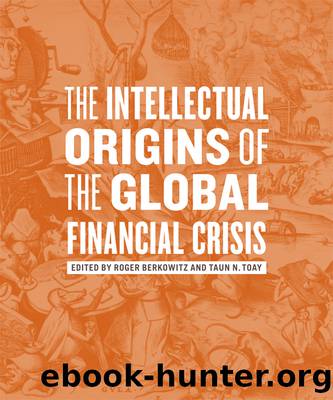The Intellectual Origins of the Global Financial Crisis by Berkowitz Roger;Toay Taun N.;

Author:Berkowitz, Roger;Toay, Taun N.;
Language: eng
Format: epub
Publisher: Fordham University Press
ELEVEN
Where Keynes Went Wrong
:: HUNTER LEWIS
I would like to begin with a few words for the students who were attending when I first offered these remarks.
I will be focusing on John Maynard Keynes. He died in 1946âit might seem long ago. But he remains immensely influential. I would argue that he is the most influential person of the last century, with Winston Churchill, another Englishman, perhaps a close second.
Virtually all world governments today may be described as Keynesian in their approach to managing economies. In particular, almost all the responses to the Crash of 2008 have come out of Keynesâs playbook. One personâs ideas have never before so thoroughly dominated the world.
I will offer a critique of Keynes and of Keynesian policies. It is a negative critique. This puts me in a very small minority of anti-Keynesians. It is not that I am alone. The worldâs biggest and busiest economic website reflects the ideas of economist Friedrich Hayek and Hayekâs teacher Ludwig von Mises, which ideas are decidedly anti-Keynesian. But even so I am in a small minority worldwide. Thus any conclusions I reach today will be highly controversial. It is important that students understand this context.
If I am offering a heretical view, ironically this might not have displeased Keynes. He described himself as a ârebel and heretic.â He spoke in his General Theory of the brave army of rebels and heretics down through the ages, and certainly included himself. I think Keynes was quite surprised when he and his ideas were so thoroughly embraced by the establishment.
Keynes was also someone who lived in the moment. He developed policy recommendations and then theory to back them up. All his friends agreed about this. It was policy first and then theory. Keynesâs last book was written during the Great Depression and reflected the conditions of that time. Would Keynes be a Keynesian today? I have my doubts. But there is no way to know for sure.
In giving my negative critique of Keynesâs ideas, the ideas that run our world today, I also want to emphasize that I am not wantonly attacking this highly respected man. This is not what is called a hatchet job. I have read just about everything Keynes wrote, read it carefully, and any assertions I make are based on what Keynes himself said.
This is important. Much of what Keynes wrote was obscure. It takes some labor to follow it, and most people donât try. They rely on what others tell them. Particularly today, when we are betting trillions of dollars and the future of our country on Keynesian remedies, this cannot be acceptable. We need to read Keynes carefully and be very clear about what he said and did not say, and then argue from there.
With this as background, letâs begin with a brief word about Keynes the man.
Sometimes in the afternoon as when I originally gave this talk, we could all use some personal stimulus. If John Maynard Keynes had been there in person, he certainly would supply that stimulus.
Download
This site does not store any files on its server. We only index and link to content provided by other sites. Please contact the content providers to delete copyright contents if any and email us, we'll remove relevant links or contents immediately.
International Integration of the Brazilian Economy by Elias C. Grivoyannis(74267)
The Radium Girls by Kate Moore(11615)
Turbulence by E. J. Noyes(7690)
Nudge - Improving Decisions about Health, Wealth, and Happiness by Thaler Sunstein(7237)
The Black Swan by Nassim Nicholas Taleb(6756)
Rich Dad Poor Dad by Robert T. Kiyosaki(6172)
Pioneering Portfolio Management by David F. Swensen(6068)
Man-made Catastrophes and Risk Information Concealment by Dmitry Chernov & Didier Sornette(5641)
Zero to One by Peter Thiel(5484)
Secrecy World by Jake Bernstein(4385)
Millionaire: The Philanderer, Gambler, and Duelist Who Invented Modern Finance by Janet Gleeson(4088)
The Age of Surveillance Capitalism by Shoshana Zuboff(3979)
Skin in the Game by Nassim Nicholas Taleb(3964)
The Money Culture by Michael Lewis(3840)
Bullshit Jobs by David Graeber(3825)
Skin in the Game: Hidden Asymmetries in Daily Life by Nassim Nicholas Taleb(3718)
The Dhandho Investor by Mohnish Pabrai(3559)
The Wisdom of Finance by Mihir Desai(3521)
Blockchain Basics by Daniel Drescher(3325)
